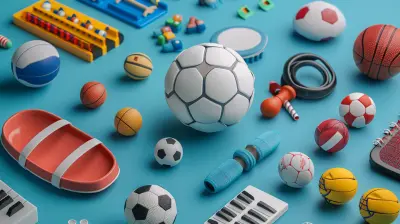How to Develop Technical Skills Without a Formal Education
17 October 2025
So, you’ve got the drive to break into the tech world, but there’s just one catch—you don’t have a fancy degree. Guess what? That’s not a deal breaker anymore.
We're living in a time where skill often speaks louder than a diploma. In fact, many successful tech professionals didn’t earn their status in a classroom. They rolled up their sleeves and learned the ropes outside the traditional academic system.
In this guide, we’re going to walk through practical, real-world steps to help you develop technical skills without stepping foot in a college lecture hall.
Ready to take charge of your career path? Let’s dive in.
📌 Why Technical Skills Matter More Than Ever
Technical skills are more than just knowing how to write code or manage servers. They're your ticket to high-paying jobs, freelancing gigs, entrepreneurship, and a whole new level of independence.Think of technical skills as modern superpowers. From software development to data analysis, cybersecurity to cloud computing—all these fields are hungry for skilled, passionate individuals.
And the best part? Most hiring managers care more about what you can do than where you learned it.
💡 Can You Really Learn Technical Skills on Your Own?
Short answer? Absolutely.In the internet age, knowledge is just a click away. You don’t need a professor to teach you Python or a campus to understand machine learning. Thousands of self-taught programmers, developers, and tech entrepreneurs have paved the way.
The only real requirement? A curious mind and the commitment to keep going when things get tough (and they will).
🛠️ Step-by-Step: How to Develop Technical Skills Without a Formal Education
Let’s break it down into digestible, actionable steps.1. 🎯 Choose Your Path
Before you start, you need direction. You don’t want to dive into everything at once—that's a recipe for burnout.Ask yourself:
- What interests me most? (Web development, software engineering, cloud computing?)
- Do I want to work for a company or freelance?
- Am I a visual learner or do I learn best by doing?
Taking time to answer these questions will save you months of confusion later. When your goal is clear, your path becomes less foggy.
2. 📚 Build the Right Learning Environment
Okay, you’ve picked your path. Now let’s talk about resources.Some of the best free (and affordable) platforms include:
- freeCodeCamp
- Coursera
- edX
- Khan Academy
- Udemy
- YouTube Tutorials
- MIT OpenCourseWare
You don’t have to spend big bucks to get started. The internet is a 24/7 classroom, and you’re the student of the decade.
Pro tip: Mix up your resources. Watch a video, then read an article, then do a hands-on project. This keeps things fresh and helps the knowledge stick.
3. 👨💻 Practice, Practice, Practice
You can’t just consume content. You’ve got to create.Let’s say you’re learning to code—start building small projects:
- A calculator
- A to-do list app
- A personal blog
- A weather checker
Why? Because when you build stuff, you learn stuff. Every bug you fix, every feature you add takes you one step closer to mastery.
Remember, watching someone write code is not the same as writing code. It’s like watching someone cook and expecting to become a chef.
Get your hands dirty.
4. 🌱 Start Small, Then Go Big
Start with beginner-friendly projects, then gradually level up. As your confidence grows, so should your challenges.Here’s how you could scale:
- Beginner: Hello World, basic HTML/CSS pages
- Intermediate: REST APIs, CRUD apps
- Advanced: Full-stack web apps, design systems, automation scripts
Not sure what to build? Search online for "beginner programming project ideas,” and you’ll stumble upon endless inspiration.
5. 🤝 Join Online Communities
Learning alone can feel isolating. That’s where online communities come in.Places like:
- Reddit (r/learnprogramming, r/coding)
- Twitter (X)
- Discord Communities
- Stack Overflow
- GitHub
These platforms are goldmines. You can ask questions, share projects, get feedback, and even land internships or freelance gigs.
And here’s a secret: People love helping beginners who show effort. Be curious, be humble, and ask for help when you need it.
6. 🧠 Create a Habit of Learning
You've got the tools. Now you need consistency.Set a daily or weekly schedule. Even 30 minutes a day can add up fast.
Here’s a simple structure:
- Monday - Learn something new
- Tuesday - Review and take notes
- Wednesday - Build a mini project
- Thursday - Debug and improve
- Friday - Share your progress on social media
- Weekend - Rest or explore something fun and related
Habits build momentum. Momentum builds confidence.
7. 📝 Document Everything
Start a digital diary of your learning journey. Use a tool like Notion, Google Docs, or even a Medium blog.Include:
- What you learned
- What confused you
- Wins and failures
- Links to helpful resources
This reinforces your learning and helps others following your path. It also shows potential employers that you’re serious about self-growth.
Bonus tip: Turn your learning notes into tutorial articles. Teaching others is one of the best ways to learn deeply.
8. 💼 Build a Killer Portfolio
Think of your portfolio as your real-world resume. It shows what you’ve built, how you think, and what you’re capable of.Include:
- A clean, personal website
- Projects with detailed descriptions
- GitHub links
- Screenshots and live demos
- “A little about me” section
Your portfolio should scream: “Hey, I may not have a degree, but I’ve got the skills and the proof.”
9. 👩💻 Contribute to Open Source
This is huge. Open source gives you real-world experience, plus the chance to collaborate with other devs.While it can be intimidating at first, don’t worry—there are beginner-friendly projects that welcome newcomers.
You’ll pick up best practices, improve your skills, and add serious weight to your resume or portfolio.
And it shows employers that you can work in a team—even if it's virtual.
10. 📣 Market Yourself
Yes, you need to sell yourself. But it doesn’t have to feel slimy.Simply do this:
- Share your projects on LinkedIn, Twitter, and coding forums
- Write short blog posts on what you’ve learned
- Create a video tutorial on YouTube or TikTok
Even just tweeting “Day 26 of building 100 coding projects” can land you followers, mentors, and job leads.
People are watching. Show them what you're doing.
11. 🎓 Earn Certifications (Optional but Helpful)
While degrees are optional, certifications can boost your credibility.Look into:
- Google’s IT Support Certificate (via Coursera)
- AWS Certified Developer
- CompTIA A+
- Microsoft Azure Certifications
- Cisco Network Certifications
These are low-cost, high-impact additions to your resume that show you’re serious, committed, and industry-ready.
🚀 Real Stories: Self-Taught Tech Pros Who Made It
Still feeling skeptical? Let’s talk proof.- Kevin Smith dropped out of high school, taught himself Python, and now works at a fintech startup.
- Natalie Davis was a single mom with no college degree. She took freeCodeCamp, built a portfolio, and now earns six figures as a front-end developer.
- Alex Soto, once a retail assistant, learned DevOps through YouTube and now works remotely from Thailand.
These aren’t rare cases. They’re becoming the norm. You can write your own success story too.
📈 What to Do After You Gain Skills
Skills are great, but they’re just the beginning. Here’s what’s next:- Start freelancing on platforms like Upwork or Fiverr
- Apply for internships (many don’t require a degree)
- Find a mentor in the tech community
- Launch your own tech startup
- Keep learning and upgrading your skills
The sky isn’t the limit. Your mindset is.
💬 Final Thoughts: You’re in the Driver’s Seat
Let’s be real—learning tech skills without a degree isn’t always easy. You’ll face doubt, imposter syndrome, and probably shout at your screen more than once.But guess what? That’s all part of the process.
Remember this: It’s not about how you start—it’s about how you keep going.
With consistency, curiosity, and courage, you can go from zero to hero without ever seeing a college campus.
So go on—open up that code editor, sign up for that course, reach out to that community. Your future self will thank you.
You’ve got this.
all images in this post were generated using AI tools
Category:
Skill DevelopmentAuthor:

Madeleine Newton
Discussion
rate this article
1 comments
Heath Harmon
Great tips! Combining online resources and real-world projects really enhances practical technical skills.
October 19, 2025 at 3:31 AM

Madeleine Newton
Thank you! I’m glad you found the tips helpful. Combining both online resources and hands-on projects is indeed a powerful way to build technical skills!


